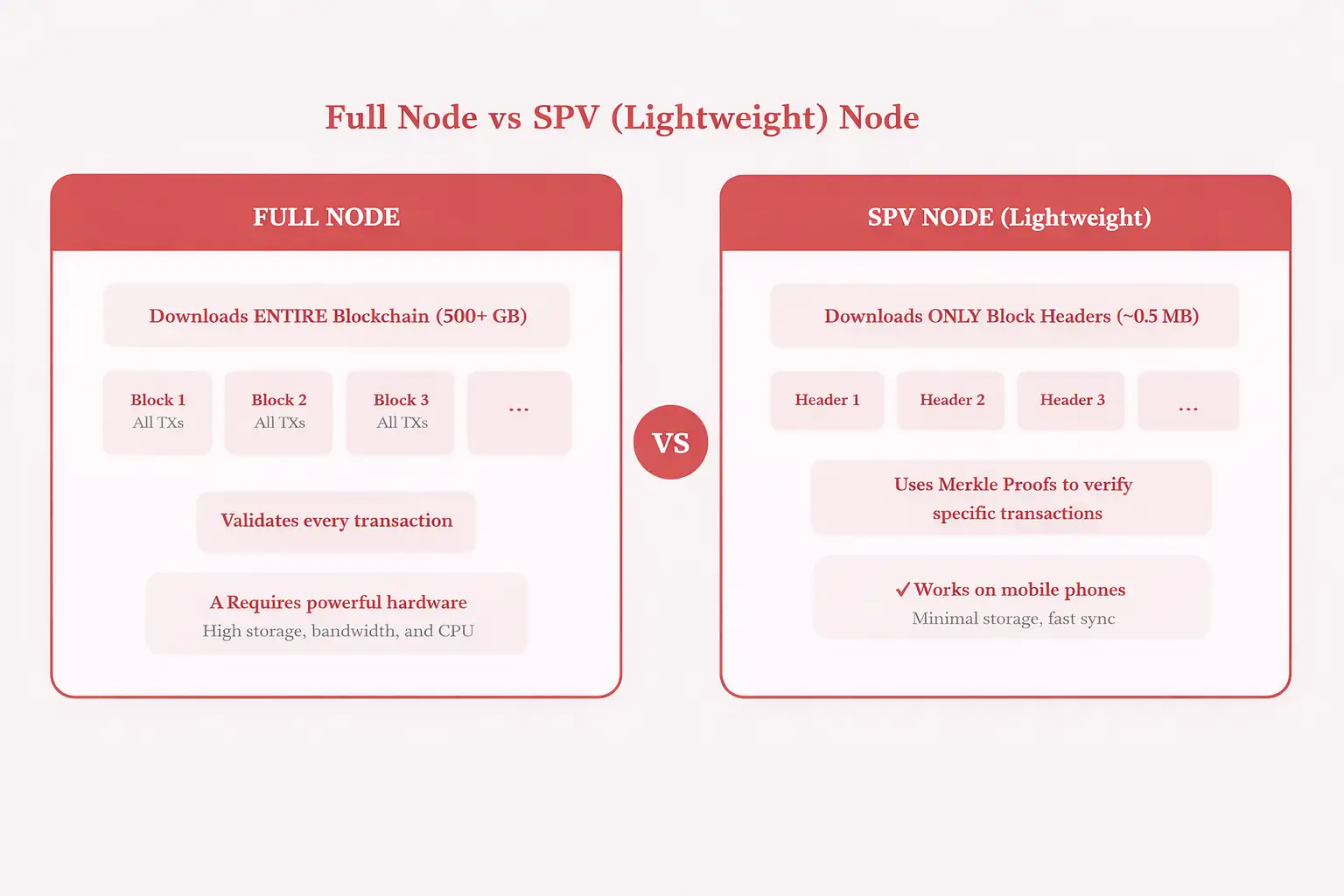Key Takeaways
- 01. Simplified Payment Verification (SPV) allows users to verify Bitcoin transactions without downloading the entire blockchain.
- 02. SPV was described by Satoshi Nakamoto in section 8 of the original Bitcoin whitepaper published in 2008.
- 03. SPV clients only download block headers instead of full blocks, reducing storage needs from hundreds of gigabytes to just a few megabytes.
- 04. Merkle proofs are the cryptographic mechanism that makes SPV possible by verifying transaction inclusion without full block data.
- 05. Most mobile Bitcoin wallets rely on SPV technology to function efficiently on smartphones and tablets.
- 06. SPV nodes trust that the longest chain with the most proof of work is valid, relying on the honesty of the mining majority.
- 07. While SPV is less secure than running a full node, it offers a strong balance between usability and trustless verification.
- 08. Bloom filters were historically used by SPV wallets to request relevant transactions while preserving some privacy.
- 09. SPV technology plays a critical role in scaling Bitcoin adoption by making the network accessible on resource constrained devices.
- 10. Companies like Nadcab Labs help businesses build Bitcoin and blockchain applications that leverage SPV for lightweight and efficient transaction verification.
When most people think about Bitcoin, they imagine mining rigs and full nodes processing every single transaction. But here is a reality check: not everyone needs to download the entire Bitcoin blockchain to use it securely. This is exactly the problem that Simplified Payment Verification in Bitcoin was designed to solve.
Imagine you want to confirm that a friend actually sent you money through Bitcoin. Do you really need to check every transaction that has ever happened on the network? Of course not. You just need enough proof that your specific transaction is real and included in a valid block. That is the core idea behind SPV, a concept introduced by Satoshi Nakamoto in the original Bitcoin whitepaper.
In this guide, we will break down what SPV means, how it works under the hood, why it matters for everyday Bitcoin users, and how it compares to running a full node. Whether you are a crypto beginner, an investor, or a developer building Bitcoin applications, this article will give you a clear and practical understanding of one of Bitcoin’s most useful yet underappreciated features.
What Is Simplified Payment Verification (SPV)?
Simplified Payment Verification, commonly known as SPV, is a method that allows a Bitcoin user to verify that a particular transaction has been included in a block without needing to download and store the entire blockchain. Instead of processing every transaction ever made on the Bitcoin network, an SPV client only needs to download the block headers, which are tiny summaries of each block.
To put this in perspective, the full Bitcoin blockchain is over 500 gigabytes in size as of 2025. An SPV client, on the other hand, only needs around 50 to 80 megabytes of block header data to function. That is a reduction of over 99%, making it possible to run a Bitcoin wallet on a mobile phone or a low powered device.
Think of it like verifying a page in a library book. A full node reads the entire book cover to cover to confirm one sentence is real. An SPV client checks the table of contents, finds the right chapter, and uses a bookmark system to confirm the sentence exists without reading every page. The result is the same confidence that the sentence is real, achieved with far less effort.

Why Satoshi Nakamoto Included SPV in the Bitcoin Whitepaper
Satoshi Nakamoto understood from the very beginning that Bitcoin’s blockchain would grow significantly over time. If every user was required to run a full node to make or receive payments, Bitcoin would never achieve mass adoption. The hardware and bandwidth requirements alone would exclude the vast majority of people.
Section 8 of the original Bitcoin whitepaper is dedicated entirely to Simplified Payment Verification. Satoshi wrote that it is possible to verify payments without running a full network node, and that a user only needs to keep a copy of the block headers of the longest proof of work chain.
This was a forward thinking design decision. It meant that even as Bitcoin grew to millions of users, individuals and businesses could still verify transactions on lightweight devices without compromising the fundamental trustless nature of the network.
How Does SPV Work? A Step by Step Explanation
Understanding how SPV works is easier than you might think. Let us walk through the process step by step, using simple language and relatable comparisons.
Understanding Merkle Trees: The Engine Behind SPV
Merkle trees are the cryptographic structure that makes Simplified Payment Verification possible. Without them, there would be no efficient way to prove that a transaction exists in a block without downloading all the transactions.
A Merkle tree works by taking all the transactions in a block and hashing them in pairs. The resulting hashes are then hashed again in pairs, and this process continues until a single hash remains at the top. This final hash is called the Merkle root, and it is stored in the block header.
The beauty of this structure is that you can prove any single transaction is part of the tree by providing only the sibling hashes along the path from the transaction to the root. This is what we call a Merkle proof or Merkle path. For a block with 4,000 transactions, you only need about 12 hashes to prove inclusion, rather than all 4,000 transactions.
SPV Nodes vs Full Nodes: What Is the Difference?
One of the most common questions in Bitcoin education is: should I run a full node or is an SPV wallet enough? The answer depends on your goals, technical resources, and how much trust you are willing to place in the network.
A full node downloads, validates, and stores every block and every transaction in Bitcoin’s history. It independently verifies all the consensus rules and does not rely on any third party. A full node is the gold standard of Bitcoin security and sovereignty.
An SPV node, on the other hand, is designed for efficiency. It trusts that the longest proof of work chain is valid and only verifies the transactions that are relevant to the user. This makes it faster, lighter, and perfect for mobile devices, but it does come with certain trade offs in security and privacy.
Comparison Table: Full Node vs SPV Node
| Feature | Full Node | SPV Node |
|---|---|---|
| Data Downloaded | Entire blockchain (500+ GB) | Block headers only (~60 MB) |
| Validation | Validates all transactions and rules | Validates only relevant transactions via Merkle proofs |
| Hardware Needed | Desktop or dedicated server | Mobile phone, tablet, or basic laptop |
| Sync Time | Hours to days for initial sync | Minutes to get started |
| Security Level | Highest (fully trustless) | High but relies on honest majority assumption |
| Privacy | Strong (no data shared) | Weaker (may expose addresses to peers) |
| Network Contribution | Strengthens the network by relaying blocks | Does not contribute to block propagation |
| Best For | Power users, miners, and businesses | Everyday users and mobile wallets |
Real World Applications of SPV in Bitcoin
SPV is not just a theoretical concept. It powers some of the most widely used Bitcoin applications in the world today:
- Mobile Bitcoin Wallets: Apps like Electrum, Breadwallet (now BRD), and Bitcoin Wallet for Android all use SPV principles to let users send and receive Bitcoin without downloading hundreds of gigabytes of data.
- Point of Sale Systems: Merchants accepting Bitcoin payments need fast transaction verification. SPV allows payment terminals to confirm incoming payments in seconds without running a full node on site.
- Internet of Things (IoT): Smart devices with limited processing power and storage can interact with the Bitcoin blockchain through SPV, enabling machine to machine micropayments and automated billing.
- Embedded Hardware Wallets: Some hardware wallets use SPV verification internally to validate transactions before signing them, keeping the device lightweight while maintaining security.
- Cross Chain Bridges: Some blockchain interoperability solutions use SPV style proofs to verify Bitcoin transactions on other networks without running a full Bitcoin node on the secondary chain.
Benefits of Simplified Payment Verification
SPV offers several significant advantages that contribute directly to Bitcoin’s usability and adoption:
SPV requires only megabytes of storage instead of hundreds of gigabytes, making Bitcoin accessible on any device with an internet connection.
New SPV wallets can sync with the network in minutes rather than the hours or days required for a full node to download the complete chain.
Even though SPV does not validate every transaction, it still provides cryptographic proof that your transactions are real and included in the blockchain.
By lowering the technical barrier to entry, SPV allows millions of people around the world to use Bitcoin without needing specialized hardware.
Limitations and Security Risks of SPV
While SPV is remarkably useful, it is important to understand its limitations so you can make informed decisions about when to use it and when a full node might be more appropriate.
- Honest Majority Assumption: SPV trusts that the majority of mining power is honest. In the extremely unlikely event of a 51% attack, an SPV client could be deceived into accepting fraudulent transactions.
- Privacy Concerns: Traditional SPV wallets using Bloom filters can leak information about which addresses belong to the user. Full nodes connected to the SPV wallet can potentially track which transactions the user is interested in.
- Dependency on Full Nodes: SPV clients cannot function in isolation. They rely on full nodes to provide block headers and Merkle proofs. If connected to malicious full nodes, there is a risk of receiving incomplete or misleading data.
- Cannot Validate Consensus Rules: SPV nodes cannot independently verify that all consensus rules are being followed across the entire blockchain. They trust the chain with the most work rather than verifying every rule themselves.
- Eclipse Attacks: If an attacker controls all the full nodes an SPV wallet connects to, they could feed it a fabricated blockchain. Modern SPV implementations mitigate this through randomized peer connections and checkpoint systems.
Bloom Filters vs Compact Block Filters: The Evolution of SPV Privacy
Early SPV implementations used a technology called Bloom filters (defined in BIP 37) to request only relevant transactions from full nodes. The idea was to send a probabilistic filter to a full node that would match only the user’s transactions, reducing the data transfer.
However, researchers discovered that Bloom filters leaked significant privacy information. Full nodes could analyze the filter patterns to figure out which addresses belonged to the SPV user. This was a serious flaw that undermined one of Bitcoin’s key value propositions.
The solution came in the form of Compact Block Filters, described in BIP 157 and BIP 158. In this improved approach, the full node creates a compressed filter for each block, and the SPV client downloads these filters to check locally whether a block contains any relevant transactions. This reverses the privacy model because the full node never learns which transactions the user is looking for.
Modern SPV wallets like Neutrino (used in some Lightning Network implementations) use compact block filters for significantly improved privacy while maintaining the lightweight benefits of SPV.
SPV and the Lightning Network
The Lightning Network, Bitcoin’s primary layer 2 scaling solution, has a natural relationship with SPV. Lightning enables instant, low cost Bitcoin payments by creating payment channels between users. But to open and close these channels, users still need to interact with the main Bitcoin blockchain.
SPV makes it possible for mobile Lightning wallets to verify on chain channel transactions without running a full Bitcoin node. This is critical for making Lightning accessible to everyday users who want fast payments from their smartphones.
The Neutrino protocol, which implements compact block filters, was specifically designed with Lightning Network wallets in mind. It provides a privacy respecting, lightweight way for Lightning nodes to stay synchronized with the Bitcoin blockchain.
Business and Developer Relevance of SPV Technology
For businesses building Bitcoin powered products, SPV is not just a convenience. It is a strategic technology choice that directly affects user experience, infrastructure costs, and scalability.
- Lower Infrastructure Costs: Running full nodes is expensive. SPV allows businesses to offer Bitcoin payment verification to customers without maintaining costly full node infrastructure for every endpoint.
- Better User Experience: Nobody wants to wait hours for a wallet to sync. SPV provides near instant readiness, which is essential for consumer facing applications.
- Scalable Architecture: SPV allows applications to serve thousands of users simultaneously without each user needing independent full node access.
- IoT and Embedded Systems: For businesses exploring machine to machine Bitcoin payments, SPV is the only practical verification method on devices with limited compute and storage resources.
Building blockchain applications that properly implement SPV verification, handle edge cases around network connectivity, and maintain user privacy requires deep technical expertise. Companies like Nadcab Labs work with businesses and developers worldwide to build Bitcoin and blockchain applications that are lightweight, secure, and production ready, leveraging technologies like SPV to deliver optimal performance.
Common Misconceptions About SPV in Bitcoin
SPV is widely used but often misunderstood. Let us address some of the most common myths:
❌ “SPV wallets are not secure.”
SPV wallets provide strong cryptographic verification through Merkle proofs. While they are not as secure as full nodes, they are far more secure than trusting a centralized server. The risk is theoretical and requires an attacker to control the majority of the mining network.
❌ “SPV means trusting a third party.”
SPV does not require trusting any specific third party. It verifies transactions using cryptographic proofs from the blockchain itself. The trust assumption is in the mining majority following the rules, not in any single server or company.
❌ “All mobile wallets use true SPV.”
Not all mobile wallets implement genuine SPV verification. Some mobile wallets are actually thin clients that simply trust a centralized server for transaction data. True SPV wallets download block headers and verify Merkle proofs independently.
❌ “SPV will become obsolete as hardware improves.”
Even as hardware gets better, the Bitcoin blockchain continues to grow. SPV remains essential for mobile devices, IoT applications, and any use case where downloading the full chain is impractical. It also plays a critical role in layer 2 protocols like the Lightning Network.
The Future of SPV and Lightweight Bitcoin Verification
SPV technology continues to evolve alongside the broader Bitcoin ecosystem. Here are some developments shaping its future:
- Compact Block Filters (Neutrino): This BIP 157/158 standard is becoming the preferred approach for SPV privacy, replacing the older and flawed Bloom filter system.
- Utreexo: A proposed accumulator design that could allow even full nodes to operate with dramatically reduced storage, blurring the line between full and lightweight verification.
- ZK Proofs for Verification: Research into zero knowledge proofs could eventually allow clients to verify Bitcoin state transitions with even less data and greater privacy than current SPV methods.
- Assumeutxo: A Bitcoin Core feature that allows new full nodes to start quickly using a trusted UTXO snapshot, then verify the full chain in the background. This brings SPV like speed to full node setups.
- Cross Chain SPV Proofs: As Bitcoin interacts with sidechains and other blockchains, SPV proofs are being adapted for trustless cross chain verification, enabling more sophisticated interoperability solutions.
As described in Bitcoin’s developer documentation, SPV is a foundational operating mode that will continue to be refined as the network grows and new technologies emerge.
Conclusion
Simplified Payment Verification in Bitcoin is one of the most elegantly designed features of the Bitcoin protocol. It solves a fundamental challenge: how to let anyone verify transactions on a decentralized network without requiring them to process and store the entire blockchain history.
By leveraging block headers and Merkle proofs, SPV enables millions of mobile users, businesses, and IoT devices to interact with Bitcoin securely and efficiently. It is the technology that makes Bitcoin practical for everyday use, not just for those with powerful servers and unlimited bandwidth.
Of course, SPV is not a replacement for running a full node. For users and businesses that need maximum security and complete sovereignty, a full node remains the best choice. But for the vast majority of use cases, SPV provides the ideal balance between security, convenience, and resource efficiency.
As the Bitcoin ecosystem continues to mature with developments like compact block filters, Utreexo, and the Lightning Network, SPV technology will only become more powerful and privacy preserving. Understanding how it works today puts you ahead of the curve, whether you are an investor evaluating Bitcoin wallets, a developer building applications, or an entrepreneur exploring blockchain solutions.
Frequently Asked Questions
SPV wallets can handle transactions of any size, but for very large transfers, it is recommended to wait for more block confirmations (six or more) to ensure finality. Some users also choose to verify large transactions using a personal full node for added peace of mind.
Yes, the SPV concept applies to any blockchain that uses a similar block header and Merkle tree structure. Bitcoin Cash, Litecoin, and several other cryptocurrencies support SPV verification in their wallet implementations, though the specific protocols and filter types may vary.
An SPV wallet uses a tiny fraction of the bandwidth required by a full node. Initial sync may consume around 50 to 80 MB for block headers, while ongoing usage depends on transaction frequency. A full node, by comparison, can use several gigabytes monthly just to stay synchronized with new blocks.
SPV wallets can detect confirmed double spends by checking whether a transaction appears in the longest valid chain. However, they are less reliable at detecting unconfirmed double spend attempts in the mempool compared to full nodes, which is why waiting for at least one confirmation is always recommended.
Yes. Using a wallet that supports compact block filters (BIP 157/158) instead of the older Bloom filter approach significantly improves privacy. You can also route your SPV wallet through Tor to hide your IP address and connect to your own full node over the network for maximum privacy while still using a lightweight client.
Since each block header is only 80 bytes, thousands of headers can be downloaded per second on a typical internet connection. The entire set of block headers from Bitcoin’s genesis block to the present can usually be downloaded in under a minute on a modern device, which is why SPV wallets sync so quickly.
Hardware wallets themselves primarily handle key storage and transaction signing. The verification of transaction data is typically handled by their companion software (like Ledger Live or Trezor Suite), which may use SPV style verification or connect to full nodes or trusted servers depending on the implementation and user configuration.
Ethereum uses a different data structure (Patricia Merkle Tries) but the concept of lightweight verification applies. Ethereum’s light client protocol allows similar functionality to Bitcoin’s SPV. However, verifying smart contract state is significantly more complex than verifying simple payment transactions, which makes Ethereum light clients harder to implement securely.
SPV wallets handle interrupted connections gracefully. The sync process resumes from where it left off once the connection is restored. Block headers already downloaded are cached locally, so you never need to start from scratch. This makes SPV wallets particularly well suited for mobile environments with unstable connectivity.
SPV wallets do not directly contribute to network health the way full nodes do, since they do not relay blocks or validate the entire rule set. However, by enabling more people to use Bitcoin independently (rather than relying on custodial services), SPV wallets indirectly support decentralization and broader adoption, which strengthens the ecosystem as a whole.
Reviewed & Edited By

Aman Vaths
Founder of Nadcab Labs
Aman Vaths is the Founder & CTO of Nadcab Labs, a global digital engineering company delivering enterprise-grade solutions across AI, Web3, Blockchain, Big Data, Cloud, Cybersecurity, and Modern Application Development. With deep technical leadership and product innovation experience, Aman has positioned Nadcab Labs as one of the most advanced engineering companies driving the next era of intelligent, secure, and scalable software systems. Under his leadership, Nadcab Labs has built 2,000+ global projects across sectors including fintech, banking, healthcare, real estate, logistics, gaming, manufacturing, and next-generation DePIN networks. Aman’s strength lies in architecting high-performance systems, end-to-end platform engineering, and designing enterprise solutions that operate at global scale.







